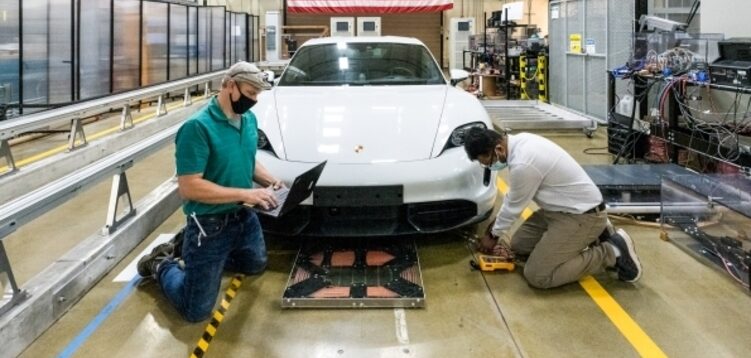Volkswagen Group of America’s Innovation Hub Knoxville, the company’s technology unit for applied materials science, has expanded its research collaboration with Oak Ridge National Laboratory (ORNL), the largest US Department of Energy science and energy laboratory, and the University of Tennessee, Knoxville (UT).
According to Volkswagen, the expanded collaboration aims to explore how to integrate breakthroughs in material science and recycling concepts to support electric mobility and sustainable transportation. The first project involves testing ORNL’s new high-power wireless EV charging concepts with a Porsche Taycan.
“We aim to leverage the unique knowledge and innovative power the Tennessee Valley holds”, said Scott Keogh, president and CEO at Volkswagen Group of America. “Volkswagen is focused to push electric mobility and new technologies for ever-more sustainable transportation. Expanding our research collaboration with Oak Ridge National Laboratory and the University of Tennessee will help drive these efforts.”
The interdisciplinary teams have started testing new wireless charging concepts for electric vehicles. Their goal is to develop a higher-power wireless charger through breakthrough designs that focus electromagnetic waves to eliminate interference, thus increasing efficiency. In the first trials, a prototype system has shown a high level of efficiency where up to 98% of the energy used (coil-to-coil) could reach the vehicle battery.
“We are excited to work with Volkswagen to demonstrate ORNL’s high-powered, ultra-efficient wireless charging technology,” said Xin Sun, associate laboratory director for Energy Science and Technology at ORNL. “Our unique polyphase electromagnetic coil design and power electronics provide high-power transfer levels in a compact system, with the potential to alleviate electric vehicle range anxiety and speed the decarbonization of the US transportation sector.” The wireless charging project is supported by the DOE Office of Energy Efficiency & Renewable Energy’s Vehicle Technologies Office.
Using Volkswagen’s experience in vehicle integration, the teams have also been able to build from a charging power level of 6.6kW up to 120kW, with a goal of 300kW – enough to provide an 80% recharge of the Porsche Taycan in about 10 minutes. The research project aims to generate new insights into the technological and physical hurdles of high-power wireless charging for automobiles.
Other research projects at the Innovation Hub are focusing on advanced functional materials, including composite car body parts and plant-based materials for future interior designs. The team is also working on new recycling concepts for materials conventionally deemed non-recyclable, such as fiber-reinforced composites.


